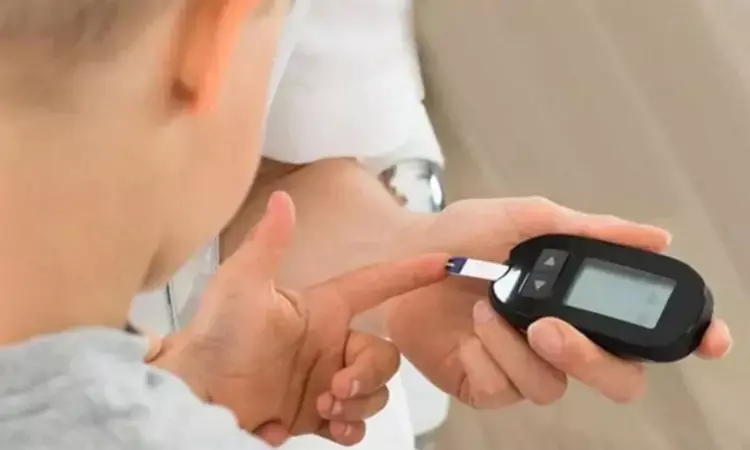- Home
- Medical news & Guidelines
- Anesthesiology
- Cardiology and CTVS
- Critical Care
- Dentistry
- Dermatology
- Diabetes and Endocrinology
- ENT
- Gastroenterology
- Medicine
- Nephrology
- Neurology
- Obstretics-Gynaecology
- Oncology
- Ophthalmology
- Orthopaedics
- Pediatrics-Neonatology
- Psychiatry
- Pulmonology
- Radiology
- Surgery
- Urology
- Laboratory Medicine
- Diet
- Nursing
- Paramedical
- Physiotherapy
- Health news
- Fact Check
- Bone Health Fact Check
- Brain Health Fact Check
- Cancer Related Fact Check
- Child Care Fact Check
- Dental and oral health fact check
- Diabetes and metabolic health fact check
- Diet and Nutrition Fact Check
- Eye and ENT Care Fact Check
- Fitness fact check
- Gut health fact check
- Heart health fact check
- Kidney health fact check
- Medical education fact check
- Men's health fact check
- Respiratory fact check
- Skin and hair care fact check
- Vaccine and Immunization fact check
- Women's health fact check
- AYUSH
- State News
- Andaman and Nicobar Islands
- Andhra Pradesh
- Arunachal Pradesh
- Assam
- Bihar
- Chandigarh
- Chattisgarh
- Dadra and Nagar Haveli
- Daman and Diu
- Delhi
- Goa
- Gujarat
- Haryana
- Himachal Pradesh
- Jammu & Kashmir
- Jharkhand
- Karnataka
- Kerala
- Ladakh
- Lakshadweep
- Madhya Pradesh
- Maharashtra
- Manipur
- Meghalaya
- Mizoram
- Nagaland
- Odisha
- Puducherry
- Punjab
- Rajasthan
- Sikkim
- Tamil Nadu
- Telangana
- Tripura
- Uttar Pradesh
- Uttrakhand
- West Bengal
- Medical Education
- Industry
Verapamil slows beta cell decline in kids with type 1 diabetes: JAMA

USA: Verapamil, a calcium channel blocker, may help in the partial preservation of stimulated C-peptide secretion in adolescents and children with newly diagnosed type 1 diabetes, a recent study has suggested. The C-peptide level is a measure of pancreatic beta cell function.
Verapamil is a drug commonly used for treating high BP (blood pressure) and heart conditions. The medication is low-cost and readily available; verapamil's known side effects include effects on the heart, liver function, and blood pressure. The study found that verapamil was well tolerated and had few side effects.
"Once-daily oral verapamil started within 31 days after type 1 diabetes diagnosis slowed beta cell decline over 52 weeks in kids aged seven to 17 years," the researchers wrote in their study. The study findings were featured in the Journal of the American Medical Association (JAMA) on February 24, 2023.
Preclinical studies have shown that thioredoxin-interacting protein overexpression induces apoptosis of pancreatic beta cells and is involved in glucotoxicity-induced beta cell death. These effects may be reduced by calcium channel blockers and may benefit beta cell preservation in type 1 diabetes.
Gregory P. Forlenza from the University of Colorado, Aurora, and colleagues aimed to investigate verapamil's effect on pancreatic beta cell function in kids with newly diagnosed type 1 diabetes in a double-blind, randomized clinical trial conducted at six centres in the US.
The trial included adolescents and children ages 7 to 17 years having newly diagnosed type 1 diabetes and weighing 30 kg or greater. Completion of the follow-up was on September 15, 2022.
Participants were randomly assigned in a ratio of 1:1; 47 to once-daily verapamil or 41 to placebo as a part of a factorial design in which people were also assigned to receive either diabetes management or standard diabetes care.
The area under the curve values for C-peptide level stimulated by a mixed-meal tolerance test at 52 weeks from type 1 diabetes diagnosis (primary outcome) was determined.
The study led to the following findings:
- Among 88 participants (mean age, 12.7 years; 36 41% were females; and the mean time from diagnosis to randomization was 24 days), 94% completed the trial.
- The mean C-peptide area under the curve was 0.66 pmol/mL at baseline. At 52 weeks, it was 0.65 pmol/mL in the verapamil group, compared to the placebo group with 0.60 pmol/mL at baseline and 0.44 pmol/mL at 52 weeks (adjusted between-group difference, 0.14 pmol/mL); equating to a 30% higher C-peptide level at 52 weeks with verapamil.
- Participants' percentage with a 52-week peak C-peptide level of 0.2 pmol/mL or greater was 71% in the placebo group versus 95% in the verapamil group.
- At 52 weeks, haemoglobin A1c was 6.6% in the verapamil group versus 6.9% in the placebo group (adjusted between-group difference, −0.3%).
- 20% in the placebo group and 17% in the verapamil group had a nonserious adverse event considered treatment-related.
"At 52 weeks from diagnosis, verapamil partially preserved stimulated C-peptide secretion in adolescents and children with diagnosed type 1 diabetes compared with placebo," the researchers wrote in their study. "Further research is required to determine the longitudinal durability of C-peptide improvement and the therapy's optimal length."
Reference:
Forlenza GP, McVean J, Beck RW, et al. Effect of Verapamil on Pancreatic Beta Cell Function in Newly Diagnosed Pediatric Type 1 Diabetes: A Randomized Clinical Trial. JAMA. Published online February 24, 2023. doi:10.1001/jama.2023.2064
Dr Kamal Kant Kohli-MBBS, DTCD- a chest specialist with more than 30 years of practice and a flair for writing clinical articles, Dr Kamal Kant Kohli joined Medical Dialogues as a Chief Editor of Medical News. Besides writing articles, as an editor, he proofreads and verifies all the medical content published on Medical Dialogues including those coming from journals, studies,medical conferences,guidelines etc. Email: drkohli@medicaldialogues.in. Contact no. 011-43720751


